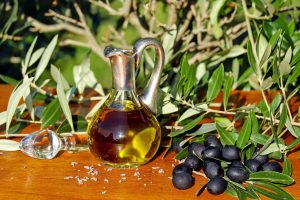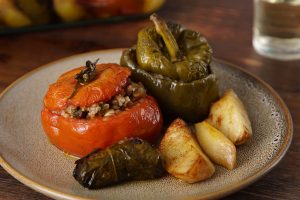Food Straight from the Land and Olive Oil: Greece’s Recipe for the Richest Life
By Katherine Metcalf • April 28, 2018
Socrates once said, “he is the richest who is content with the least.” In her Ted Talk, Greek chef and cookbook author Diane Kochilas says this quote best describes how food is the heart of the Greek identity (Kochilas, “Eat Greek. Live Well.”). Every Greek dish contains a myriad of historical, geographical, and traditional qualities that provide Greek people with the greatest pride of living off the land. While some cultures use museums as ways to respect their history, Greek people honor their past by growing, cooking, and eating natural foods that families have savored for centuries. Greek families firmly believe that olive oil or “liquid gold” provides more than just a fruity taste. For Greek citizens, natural foods like olive oil symbolize how living the richest life means enjoying the simplest and freshest foods directly from the land.

Greek people also see the processes of growing, cultivating, cooking, and, eventually, eating foods as creating life-long bonds between friends and families. In Kochilas’ Ted Talk, she proudly says how Greek people think of “food [as] more than just sustenance…it is [known as] a vehicle for socializing.” Therefore, Greek citizens not only produce the best and tastiest olive oil for themselves, but they also share the entire experience with their loved ones. In Crete, the production of olive oil serves as the most popular resource that local families grow and cultivate. Located in Kolymbari, the Dimitriadis family resides at Biolea, and has been producing and selling the finest extra-virgin olive oil from for six generations (“Who We Are”). Though the family manufactures the most valuable olive oil in the world, to put bread on the table, they also value the daily connections that spark from working with one another on a daily basis. The Dimitriadis proudly produces this specific type of olive oil because the liquid represents “the roots of people who came before [them]…and [how] the family wants to pass down the taste [of the estate] for generations to come” (“The Island Cooking of Crete”). Even though the production process requires an ample amount of time and energy, Greek families, like the Dimitriadis, believe that making memories while caring for the most beautiful crops in Greece’s tranquil weather is a priceless experience.
Greek people also fuel themselves with the freshest ingredients because they are abundant in Greek towns and thrive the best in Greece’s mild climate. Recently, I interviewed Spyridoula Cheimariou, an assistant professor in the Communicative Disorders program at The University of Alabama, regarding her most memorable childhood experiences in Athens, Greece. Cherimariou said she and her family would go to different shops for almost all of their cooking ingredients. She reminisced about buying the freshest Italian bread from bakeries, picking out the most colorful fruits and vegetables from farmers markets, and even walking into butcher shops with her parents and buying the occasional rack of lamb (Cherimariou).
Like Cheimariou, some Greek natives enjoy purchasing their own ingredients from local vendors based on their ancestors’ culinary traditions. However, there are also families who enjoy growing their own foods in their own backyards. When Koula Barydakis presents her recipe, “Olive Oil Cake with Lemon Zest,” she shares how baking this specific type of cake serves as a living tradition passed down for generations. Barydakis says, “there was no grocery store…[so] my grandfather harvested the wheat to make the flour, the olives came from trees in our yard; eggs came from our free-roaming, herb-eating chickens” (Barydakis). Although most Greek families ate cuisines with natural, organic foods, these two examples show how Greek families have different experiences behind the foods they purchase or harvest. Although Greek families may have different ways of acquiring their foods, most families still enjoy eating foods that are readily available and accessible. Furthermore, many Greek households honor their ancestors’ traditions so their family bonds can still thrive for future generations.

Greek citizens eat natural foods, such as olive oil, because most foods provide subtle but memorable tastes which carry on well past the last bite. For instance, Greek citizens in Crete nicknamed their extra-virgin olive oil, “liquid gold” because they consider it as the tastiest and healthiest type of liquid on the island. Some Cretan people actually polish off many cups of olive oil per day, because they have faith in the liquid’s powerful healing properties (“The Island Cooking of Crete”). However, Cretan citizens do not only love that extra-virgin olive oil because of its subtle but fruitful taste; they believe it possesses deeper meaning. Cretan people consider its everlasting taste a special experience that they savor. Thus, Cretan people not only drink olive oil because of its abundance on the island, but also because its flavor lets them digest the memories they make after their meals. The olive oil taste within the average Crete family represents how Greek families value the most nutritious and delicious foods that are available to them even in times of prosperity and scarcity.
Although Greek people think of eating as the focal point of social experiences, during Lent, food also becomes of the center of worship within the Greek Orthodox Church. Since many Greek families faithfully follow religious customs, many of them will fast up to 200 days per year. Abstinence for the majority of the Greek population means refraining from cooking or eating animal products, foods produced from animals, and fish containing red blood (Gaifyllia). As a result, most Greek families enjoy abundant amounts of delicious vegetable side dishes as their main courses. In her cookbook, The Foods of the Greek Islands, chef and cooking instructor Aglaia Kremezi, provides an entire chapter of flavorful salad, vegetable, and potato recipes that are perfect during times of abstinence. Domates Gemistes (Stuffed Tomatoes) is one tasty, mouthwatering recipe stuffed with rice and potatoes with lots of olive oil drizzled on top that make a meatless meal without a lack of flavor (Kremezi 199). Though Greek citizens sacrifice some of their food preferences during lent, they just eat their vegetables, rice, and bread with more of their most prized and popular resource: olive oil.
In order for Greeks to receive wholesome nutrients through the fasting process, Greek chefs created culinary specialities with large amounts of olive oil. Lathera is the name of a whole category of dishes where olive oil serves as the cooking medium and the flavoring agent. Thus, the majority of dishes in the Lathera category are hot and cold vegetable and bean stews (Kochilas, “How to use olive oil”). For Greek food lovers who need protein during times of fasting, they eat vegetables like peas that contain ample amounts of plant protein. One recipe called Arakos Latheros (Greek Style Peas) is a colorful dish with freshly cooked peas, chopped pieces of ripe tomatoes and one-half of a cup of olive oil. This dish gives Greek people an important protein source, but also an unforgettable taste. Surprisingly, Greek people consider this cuisine as comfort food especially because the vegetable juice left over can serve as a delectable dipping sauce for their after-dinner serving of Italian bread. Though these vegetable dishes cooked in olive oil do not seem extravagant, Greek people consider foods like vegetables the richest foods because they originate from the goodness of mother nature. While some cultures use decadent oils and wines, Greek people choose to honor olive oil as the dish’s compliment, sometimes even its main attraction. This tasty cooking medium, main course, dipping sauce, and topping will not go out of style any time soon in Greece. The cup or teaspoon full turns a plate of radiant vegetables into incredible indulgences that Greek families will still cherish for years to come.

While Socrates’ quote about life accurately describes the food philosophy of Greece, most of the Greek population would consider it an understatement. Because Greek natives acquire their happiness from eating olive oil and other natural foods; they make their food beliefs valuable for the global marketplace. Though some cultures think cuisine descriptions such as indulgent and nutritious belong on opposite ends of the spectrum, Greek citizens combine these two qualities because they make them excited to live well. Thus, Greeks see their culinary culture as their goodwill ambassador because they want to show the world how living the best quality of life means living off their native lands. When Greek people sit down to eat, they see more than just nutrition on their plates. Greek people see their meals as emblems of the past, symbols of gratitude for the present, and sources of hope for a bright and colorful future.
Works Cited
Barydakis, Koula. “Olive Oil Cake with Lemon Zest.” Mediterranean Living, 29 March 2017, https://www.mediterraneanliving.com/recipe-items/olive-oil-cake-lemon-zest-greek-island-crete/
Cheimariou, Spyridoula. Personal Interview. 9 February 2018.
Gaifyllia, Nancy. “Greek Orthodox Calendar of Holidays and Fasts.” the spruce, 24 November 2017, https://www.thespruce.com/greek-orthodox-calendar-1706215
“Greek Olive Oil and history.” Greek Olive Oil, 2016, http://www.greek-olive-oil.com/history.html
Kochilas, Diane. “Eat Greek. Live well: Diane Kochilas at TEDxAthens 2012.” YouTube, uploaded by TedxTalks, 11 Feb 2013, https://www.youtube.com/watch?v=gL3ZqxtW06g
Kochilas, Diane. “How to use Olive Oil in Greek Cooking,” Diane Kochilas: Greek Food for Life, https://www.dianekochilas.com/how-to-use-olive-oil-in-greek-cooking/
Kremezi, Aglaia. The Foods of the Greek Islands: Cooking and Culture at the Crossroads of the Mediterranean. Houghton Mifflin Company, 2000. pp. 199.
Paravantes, Elena. “Greek Style Peas-Arakos Latheros” OliveTomato, 2015, https://www.olivetomato.com/greek-style-peas-arakas-latheros/
“The Island Cooking of Crete.” YouTube, uploaded by The Culinary Institute of America, https://youtu.be/r0MgOpFoAs4
“Who We Are.” Astrikas’ Estate Biolea, http://biolea.gr/the-company.php